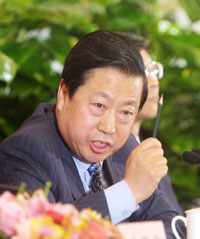'River thaw not to cause new pollution'
Updated: 2006-03-13 05:33
Russian and Chinese experts have concluded the thaw of the frozen Songhua River, where a severe toxic chemical spill happened last year, will not cause pollution again this spring, a top official said in Beijing.
The conclusion, made by nearly 1,000 experts after complicated tests and analysis in the past days, said that fish in the river and dairy products made by farms along the river can be eaten safely, said Zhou Shengxian, director of the State Environmental Protection Administration, on Saturday.
 Zhou Shengxian, director of the State Environmental Protection Administration, speaks at a news conference in Beijing March 11, 2006. [newsphoto] |
"The final conclusion is that this spring, the Songhua River will not have a second incident of pollution," he said at a news conference during the annual session of China's parliament.
A blast at a PetroChina chemical factory on November 13, 2005, in Northeast China's Jilin Province, spewed at least 100 tonnes of toxic benzene into the river.
It formed an 80 kilometre-long slick, which slowly moved downstream as the river was icing, leaving 4 million people in Harbin, the capital city of Heilongjiang Province, without tap water for days.
The toxic slick reached neighbouring Russia in the middle of December, causing great concern over the safety of drinking water.
Many people have been worried about more pollution problems as the ice of the river begins to melt in warmer weather.
Water tests in Russia revealed the pollution presented no danger to people, Russian officials have been quoted by agencies as saying.
Zhou also revealed that the Chinese Government is making major efforts to avoid similar pollution incidents in the future caused by those chemical factories located along rivers and lakes.
China has more than 21,000 chemical enterprises and factories. At least half of them are built along the Yangtze River and the Yellow River, two "mother rivers" of China.
"The result would be terrible if incidents happened in these factories," Zhou told reporters.
A national investigation on these factories was carried out before the end of January.
The problems have been caused by China's rapid economic development, which has sometimes been at the expense of environmental protection, Zhou said.
"It is impossible to solve these problems overnight," he said.
His predecessor, Xie Zhenhua, resigned after the Songhua incident.
New guidelines have since been drawn up that clearly specifies the objectives, tasks and policy measures for environmental protection in the future.
The ability to protect the environment will become a vital measure as to whether officials at various levels are qualified or not in their roles, the guidelines state.
In 2005, nearly 30,000 environmental infringement cases were investigated and sanctioned. Among them, 2,609 enterprises were suppressed or closed down, and more than 300 people punished.
Top Chinese leaders, including Premier Wen Jiabao, have promised at the annual session that China is devoted to building an energy-saving and environment-friendly society in the coming five years and beyond.
The previous ignorance in environmental protection has made China pay a lot
in the past several years. In the first four years of the State's 10th Five-Year
Plan period (2001-05), China invested a total of 600.6 billion yuan (US$72.3
billion) in pollution prevention and control.


0 Comments:
Post a Comment
<< Home